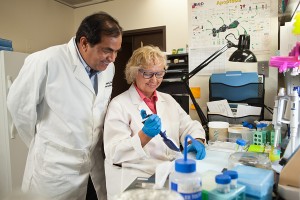Hope for Huntington’s Disease Patients
 P. Hemachandra Reddy, Ph.D., and Maria Manczak, Ph.D.
P. Hemachandra Reddy, Ph.D., and Maria Manczak, Ph.D.An estimated 30,000 Americans have Huntington’s disease and more than 200,000 people are at risk of inheriting it. Texas Tech University Health Sciences Center (TTUHSC) researchers identified a mitochondrial division inhibitor 1 (Mdivi1) that may be a promising molecule for the treatment of patients with this disease.
P. Hemachandra Reddy, Ph.D., executive director and chief scientific officer of the TTUHSC Garrison Institute on Aging and School of Medicine professor in the departments of Cell Biology & Biochemistry, Neuroscience/Pharmacology and Neurology, and Maria Manczak, Ph.D., senior research associate at the Garrison Institute on Aging, led the research study, “Mitochondrial division inhibitor 1 protects against mutant huntingtin-induced abnormal mitochondrial dynamics, synaptic dysfunction and neuronal damage in Huntington’s disease.” The research article appeared in Human Molecular Genetics.
Mitochondria are specialized organelles in a cell and are responsible for creating energy needed by the body to sustain life.
“When the mitochondria are compromised in neurons from brain disease such as Huntington’s, injury and even death to the cell occurs,” Reddy said. “Mitochondrial damage and synaptic dysfunction are the prominent features in neurons from patients with Huntington’s disease.”
According to Reddy’s research, mitochondrial division inhibitor 1 is capable of reducing mutant-huntingtin induced excessive mitochondrial fragmentation and maintaining mitochondrial function and improving synaptic activity in Huntington’s disease neurons.
“These findings suggest that mitochondrial division inhibitor 1 will improve mitochondrial function and protect against synaptic damage in Huntington’s disease,” Reddy said. “This may be a promising molecule for treatment for the Huntington’s disease patient.”
Findings from this study may also have therapeutic implications to all brain diseases with expanded polyglutamine repeats as genetic mutation(s).
“Dr. Reddy’s study findings are exciting and give hope to families struggling with Huntington’s disease,” said Michael Conn, Ph.D., senior vice president for Research and TTUHSC associate provost.
Huntington’s disease is a genetic disease that causes the progressive destruction of striatal neurons in the brain. According to the National Institute of Neurological Disorders and Stroke, Huntington’s disease is known as a family disease because every child of a parent with the disease has a 50 percent chance of inheriting the disease.
Genetic mutation that causes disease is due to the presence of expanded (more than 35) polyglutamine or CAG repeats in Huntington’s disease gene. Mutant huntingtin is a protein that expresses expanded polyglutamine repeats in all cells from patients with Huntington's disease, but selectively targets striatal neurons in the basal ganglia.
Reddy said symptoms of Huntington's disease can include progressive deterioration of cognitive processes and memory, uncontrolled, irregular, rapid, jerky movements called chorea and athetosis, a condition characterized by relatively slow involuntary movements.
This research article also discussed the therapeutic strategies that decrease mitochondrial fragmentation and neuronal damage in Huntington’s disease.
Related Stories
Celebrating Veterans: TTUHSC’s General Martin Clay’s Legacy of Service and Leadership
From his initial enlistment in the Army National Guard 36 years ago to his leadership in military and civilian health care management roles, Major General Martin Clay’s career has been shaped by adaptability, mission focus and service to others.
Texas Tech University Health Sciences Center School of Nursing Named Best Accelerated Bachelor of Science in Nursing Program in Texas
The TTUHSC School of Nursing Accelerated Bachelor of Science in Nursing (BSN) program has been ranked the No. 1 accelerated nursing program in Texas by RegisteredNursing.org.
TTUHSC Names New Regional Dean for the School of Nursing
Louise Rice, DNP, RN, has been named regional dean of the TTUHSC School of Nursing on the Amarillo campus.
Recent Stories
The John Wayne Cancer Foundation Surgical Oncology Fellowship Program at Texas Tech University Health Sciences Center Announced
TTUHSC is collaborating with the John Wayne Cancer Foundation and has established the Big Cure Endowment, which supports the university’s efforts to reduce cancer incidence and increase survivability of people in rural and underserved areas.
TTUHSC Receives $1 Million Gift from Amarillo National Bank to Expand and Enhance Pediatric Care in the Panhandle
TTUHSC School of Medicine leaders accepted a $1 million philanthropic gift from Amarillo National Bank on Tuesday (Feb. 10), marking a transformational investment in pediatric care for the Texas Panhandle.
Texas Tech University Health Sciences Center Permian Basin Announces Pediatric Residency Program Gift
TTUHSC Permian Basin, along with the Permian Strategic Partnership and the Scharbauer Foundation, Feb. 5 announced a gift that will fund a new pediatric residency.
